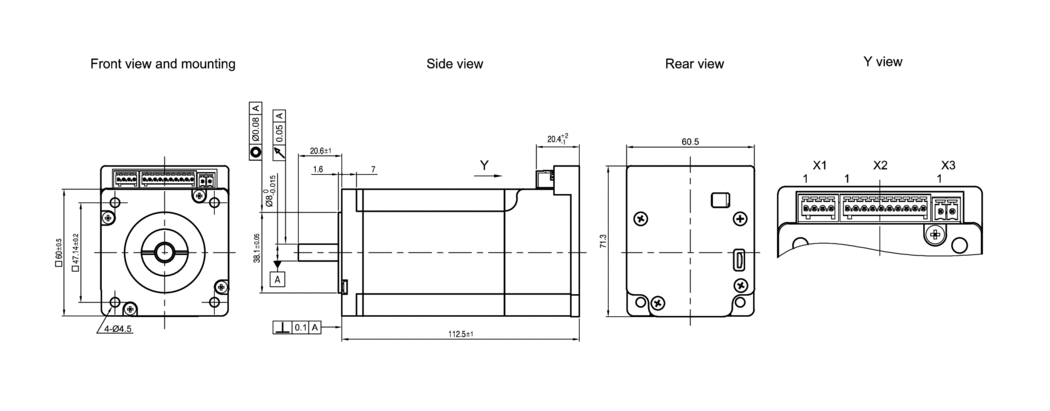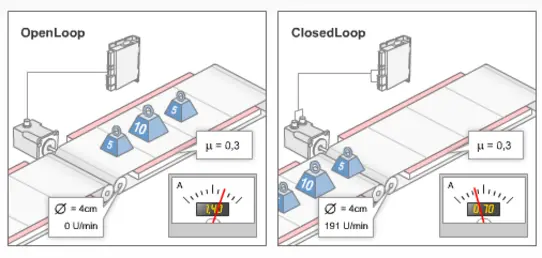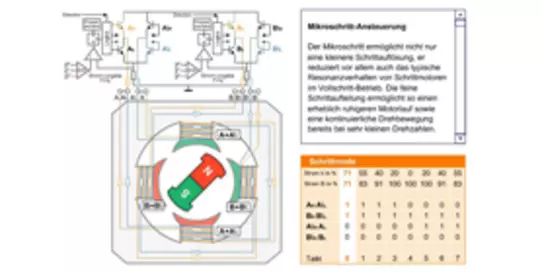This application note shows how to establish communication between Nanotec drives via CANopen. NanoJ programming allows you to realize simple master/slave functionalities, such as synchronizing two drives without a PLC.
PD4-C6018L4204-E-01 – Brushless DC servo motor with integrated controller (stepper motor) – NEMA 24
Volume Discount
For quantities greater than 10, please contact us for volume pricing.
Availability
Under „Downloads“ you will find the technical manual that corresponds with the stock firmware. Please refer to the new technical manual and the document “Instructions for Firmware Update to Version FIR-v2039” when using Plug & Drive Studio 2.
Please click on „Combine Article” or the plus sign to start the configurator.
Technical Data
-
Size 2.4 in
-
Fieldbus -
-
Holding Torque 501.31 oz-in
-
Rated Current (RMS) 4.2 A
-
Number of Digital Inputs 6
-
Number of Analog Inputs 1
-
Number of Digital Outputs 1
-
Encoder
-
Encoder Resolution 1024 CPR
-
Weight 3.5 lb
-
NEMA 24
-
Interface USB
-
Operating Voltage 12 VDC - 48 VDC
-
Peak Current (RMS) 5.4 A
-
Type of Digital Inputs 24 V, 5/24 V switchable
-
Type of Analog Input 0 - 10 V
-
Type of Digital Output open-drain (max. 24 V/100 mA)
-
Encoder Type single-turn absolute
-
Length 4.4 in
Dimensions
Torque Curves
Recommended load limit:
Maximum short-term static load that may be reached when the service life is taken into account.
Maximum short-term static load that may be reached when the service life is taken into account.
|
Torque
|
Output power
|
Torque [Nm] at 228.75 rpm
|
||
|---|---|---|---|---|
| 4.2A 48V | 2.94 | |||
| 4.2A 24V | 2.11 | |||
|
|
||||
Downloads
Datasheets
Manuals
Conformity
Accessories
| Z-K4700/50 | Capacitor |
|
|
| IO-PD4-C-01 | Test board with cable assembly for motors of the PD4-C-01 series |
|
|
| ZCPHOFK-MC0,5-4 * | Connector |
|
|
| ZCPHOFK-MC0,5-10 * | Connector |
|
|
| ZCPHOF-MC1,5-2 * | Clip-on Plug, 2-pin, RM 3.5 mm |
|
|
| ZK-MICROUSB | Micro USB cable 1.5m |
|
Knowledge Base
Our example programs show you how to use NanoJ code templates for the individual configuration of Nanotec motor controllers.
The examples and the Application Note show you how the NanoJ Library simplifies the use of the CiA 402 Power State Machine. The functions of the library are contained in a single header file, which you can easily add to your NanoJ project in Plug & Drive Studio.
Closed-loop field-oriented control is a method of running stepper motors much like a servo motor, i.e. smoothly, with low resonance and position-controlled.
This interactive, animated demonstration shows how stepper motors work. It starts when you move the "continuous" slider to the left or right. Alternatively, you can also view individual images by clicking the arrows.











